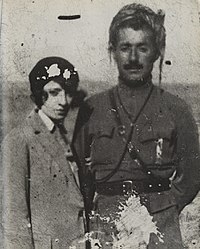Ihsan Nuri
|
Ihsan Nuri 1326-P. 27 |
|
|---|---|

Ihsan Nuri and his wife Yashar
|
|
| Born | 1892 Bitlis, Ottoman Empire |
| Died | March 25, 1976 (aged 83–84) Tehran, Pahlavi Iran |
| Allegiance | |
| Years of service |
|
| Rank |
|
| Battles/wars | |
Ihsan Nuri, also known as Ihsan Nuri Pasha (1892 or 1893, Bitlis – March 25, 1976, Tehran) was a Kurdish soldier and politician. Former officer of the Ottoman and Turkish Army. One of leaders of the Ararat rebellion as the generalissimo of the Kurdish National Forces.
Ihsan Nuri was born in the house of his father Elî Qulî in Bitlis in 1893. He came from a branch of the Jalali tribe. After finishing primary education at Gök Meydan mosque in Bitlis, he was registered to Erzincan Military School (Erzincan Askerî Rüştiyesi ). After completing secondary educatıon, he entered to Ottoman Military Academy. In 1910, he graduated from this academy as lieutenant and joined to the Ottoman Army. He participated in the counterinsurgency operations in Albania. And then he was sent to Yemen and served there for 33 months. After returning from Yemen, he was appointed the aide-de-camp of Ottoman 93rd Infantry Regiment and was sent to Beyzon. In the early stage of the First World War, he was injured at Nerman and sent back to rear area for treatment. On the way to Erzincan, he suffered from frostbite near Karaburun. After treatment in Erzincan, he was assigned to the Ottoman Ninth Army, and then he was appointed the member of the administration committee of Ozurgeti in Georgia and served as the commander of the mobile gendarmerie of the town. After the First World War, he got in contact with the Society for the Rise of Kurdistan. He wrote an article about Woodrow Wilson's Fourteen Points, and this was published on March 30, 1919 in Jîn magazine. When he arrived at Trabzon, Rushdi Bey, who was the commander of the 9th Caucassian Division, sent him to Baku to meet authorities of the Red Army.
...
Wikipedia
